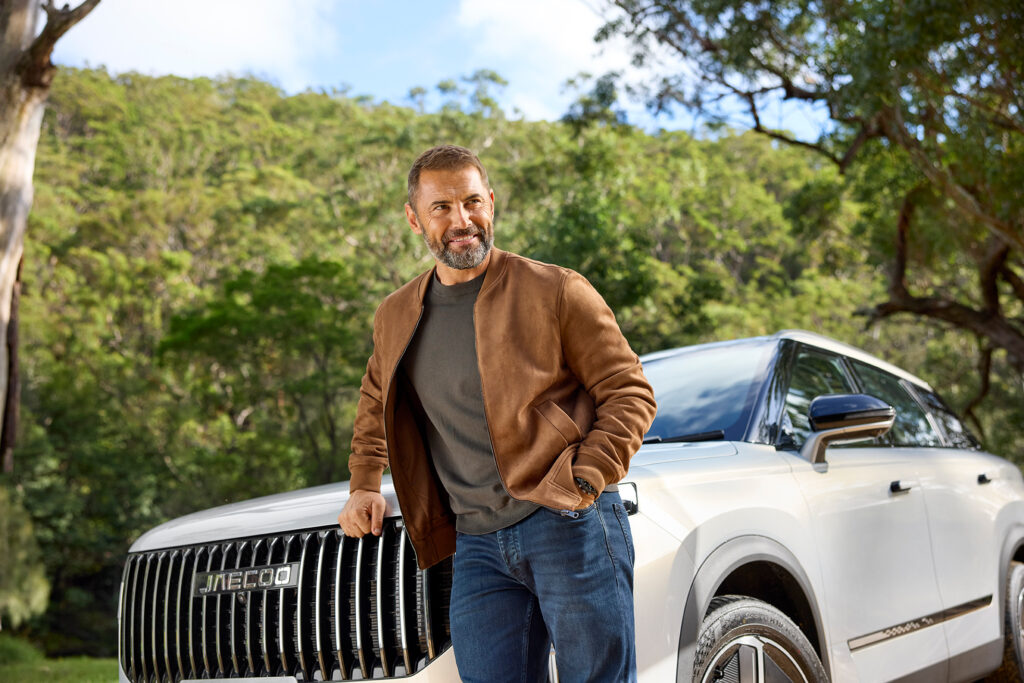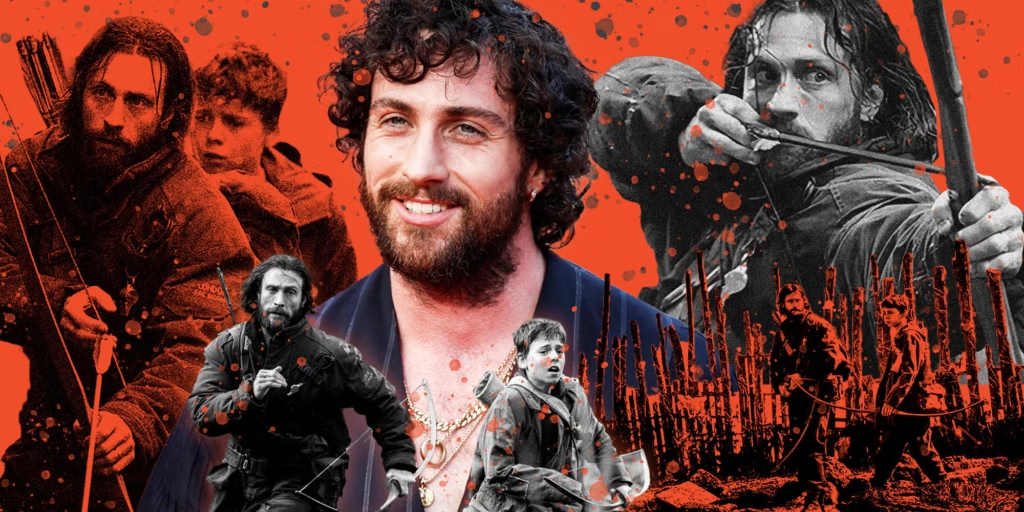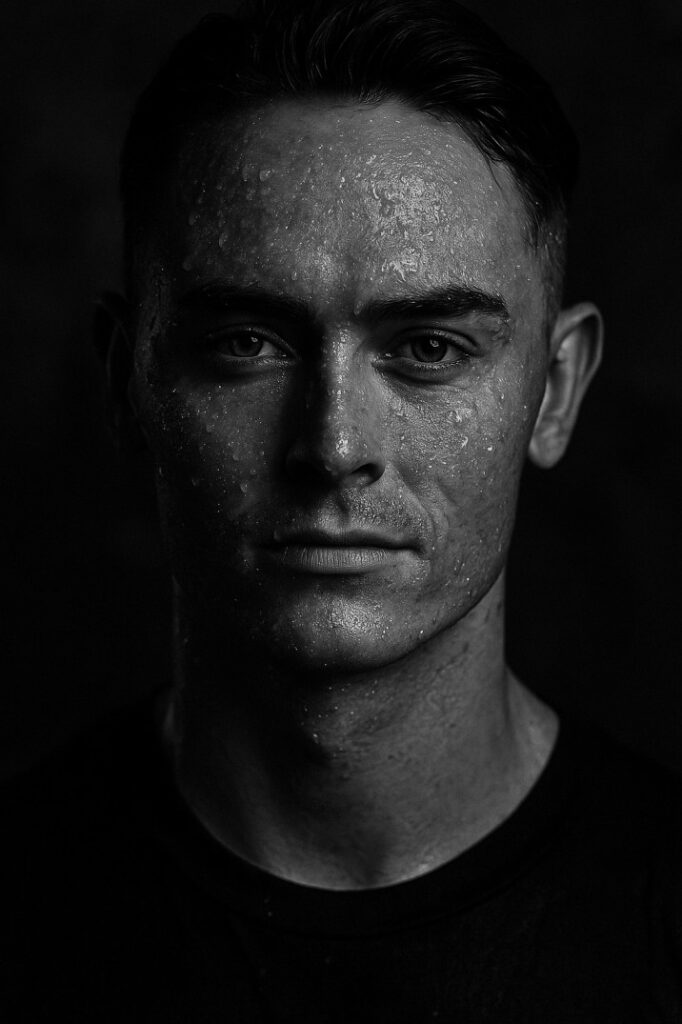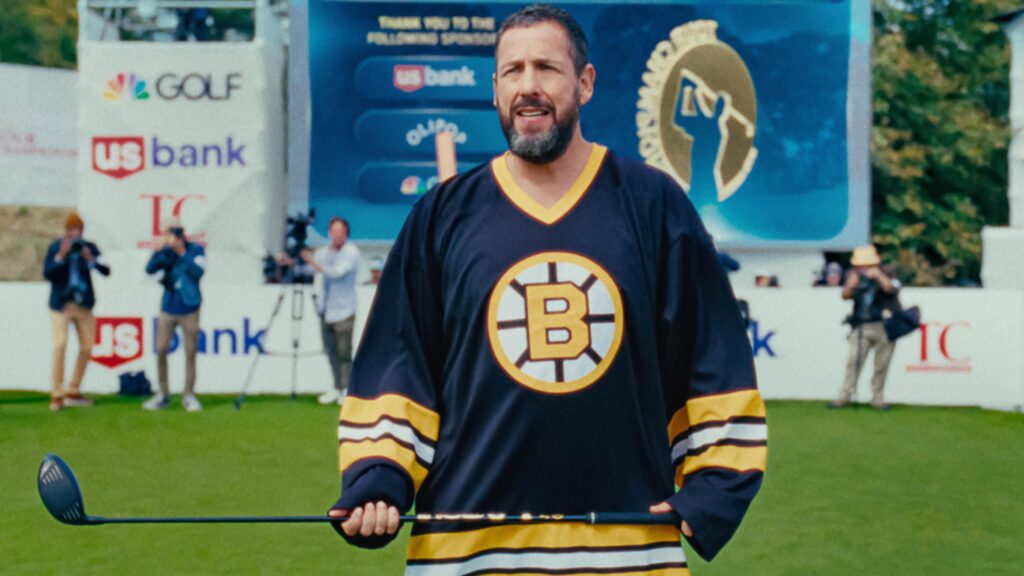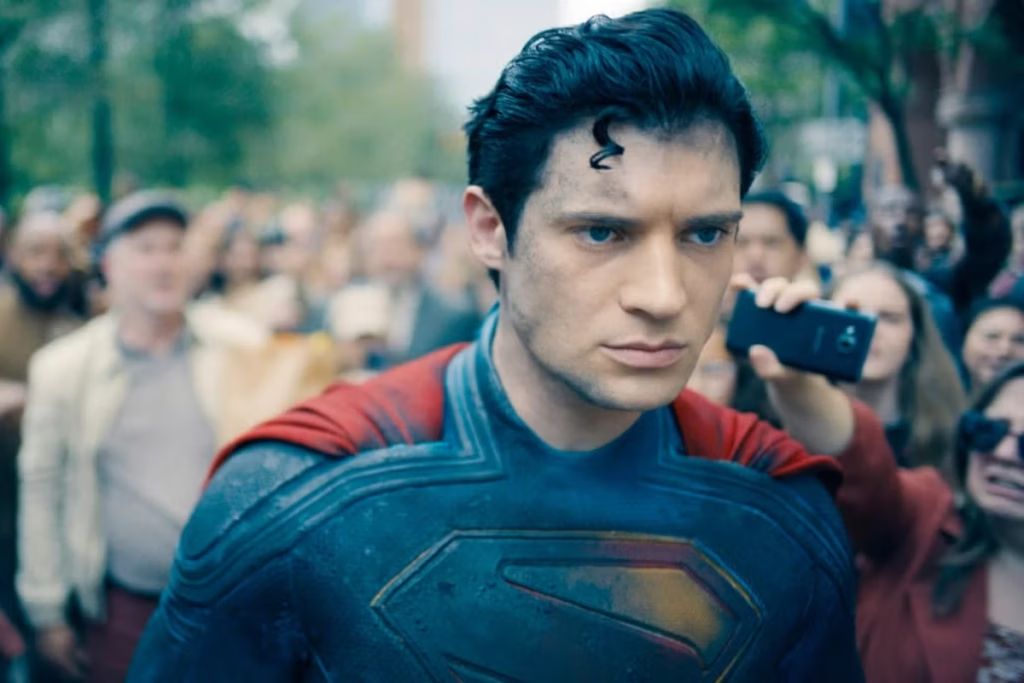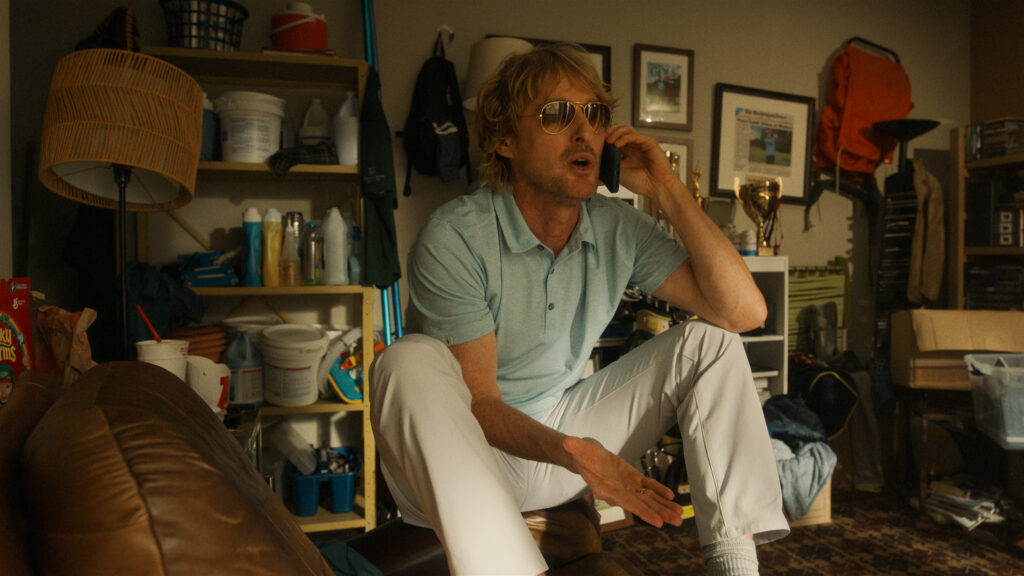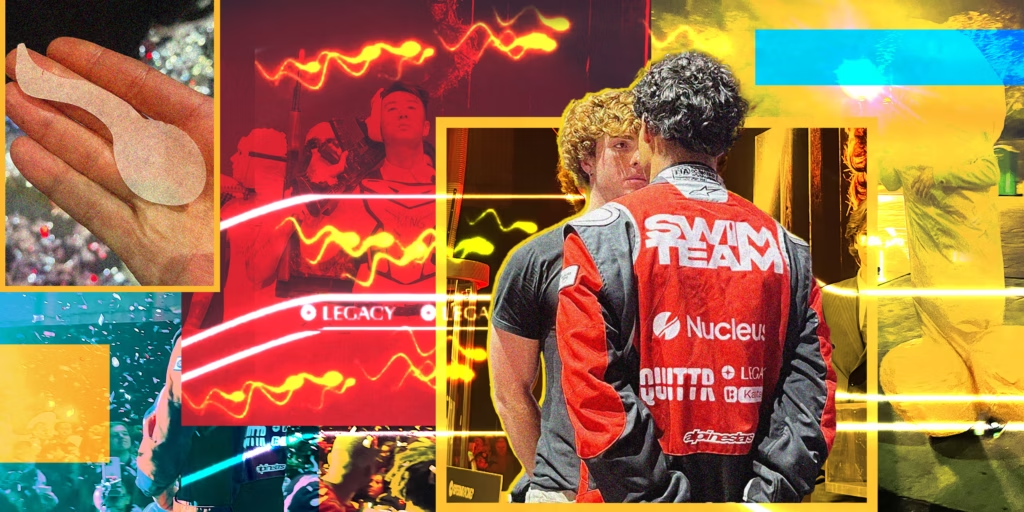Fit and firing in his fifties, Shane Warne is ready to open up about his post-cricket life. Meanwhile, his son, Jackson, still energised by his breakout appearance on SAS Australia, is right beside him, harbouring his own aspirations. In these exclusive interviews with Men’s Health, the Warne men reveal their secrets to staying healthy, productive and bonded eternally as father and son
When Shane Warne arrives for the Men’s Health photo shoot, he is polite, amicable – and businesslike. He wants to know whether it’s really going to take the time allotted. Which is quintessential Warne. Getting on with things – no fiddling about, no wasting energy on the extraneous – was always his way as the outstanding cricketer of his time. With Warne, it was, Come on, skip, toss me the ball.
And how about ramping up the aggression? Take wickets. Pursue victory. And if there’s an opportunity, I’ll gift you some theatre, too.
In his approach to things, little has changed in the 14 years since he played his final Test match. Now 51, clear-eyed, strong of body and stretched thin across a range of interests and pursuits, Warne is as purposeful as ever, too engaged with life and fatherhood to have fallen victim to the kind of existential crises that dispirit many a former athlete in the eerie quiet of retirement.
Fourteen years? Really? Fourteen years since he ripped a leg-break or clicked out a flipper in whites? Those who watched him, summer after summer, will never forget his mastery. But he’s been missing from the crease long enough for there to have emerged a new generation of cricket fans for whom the name Warne is little more than that – a name, a champion of the past, and perhaps an outspoken, coruscating voice from the commentary box.
In bringing Warne the cricketer to life, you start with the numbers. Between 1992 and 2007, he took 708 Test wickets – the second-most by any bowler in history (behind Muttiah Muralitharan) and 145 more than the next most prolific Australian (Glenn McGrath). He claimed five wickets in an innings 37 times and 10 wickets in a match 10 times. He is one of only eight players to have accomplished the 300 wickets/3000 runs double.
Toss in another benchmark – 100-plus catches (in the slips, Warne had hands like buckets) and the list shrinks to just Warne and Ian Botham. In 2000, the votes of 100 cricket experts anointed Warne (alongside Bradman, Sobers, Jack Hobbs and Viv Richards) one of Wisden’s five greatest cricketers of the 20th century.

Warne likes to point out, jovially, that among that quintet, he alone has not been knighted. Maybe that will come, though some of us might prefer it if he remained simply Warnie forever.
The bowling genius from the outer Melbourne suburb of Upper Ferntree Gully retained a priceless everyman quality: he battled intermittently with his weight, loved a smoke and a drink, swore a bit, refused to treat his baggy green like the Shroud of Turin, couldn’t abide bootcamps or self-important coaches, spoke his mind, treated posties and PMs the same… and got into hot water now and then.
Of the missteps that turned into tabloid, sex-scandal fodder, Warne has always said his chief concern was that he had hurt or embarrassed his three children. Those children (to his former wife, Simone) are now adults: daughters Brooke and Summer, 24 and 20 respectively, and 22-year-old son Jackson, a sensitive, self-contained and likeable young man who has joined his father today to talk about his plans as well as the perks and challenges of navigating life in the footsteps of a legend.
Men’s Health: Without the driver of having to be ready to bowl 25 overs in a day, what’s your approach these days to keeping fit?
Shane Warne: Sticking to a routine. Through my career, I fluctuated a little bit with my weight: it was up, it was down, I was super-fit, then not fit. And a lot of that had to do with injuries. Since I’ve retired, the health thing is both physical and mental. With the physical side of things, for probably the last 10 years or so I’ve gotten into a morning routine, whether that’s my push-ups, skipping, boxing, going for a walk or going to the gym and getting on a treadmill. I try to do something at least a few times a week.
And the mental side?
A lot of people underestimate it. Fitness is about feeling fresh and happy. We’re all busy. There’s never enough time in the day. But I’m very structured and very disciplined. I’ve got a whiteboard and I’ve got diaries. Doing things that I enjoy helps my mental health, like playing golf a couple of days a week and walking a course for four hours. I’ve got a lot on my plate in terms of business things and being a bit of an entrepreneur, and I think the fitter you are and the happier you are, the better decisions you make.
How did you feel about turning 50? Was that challenging, psychologically?
Not at all. In a way, I think I’ve gotten better with age. I think I understand myself so much better. My fitness is great. The business side of things is going better than it ever has. And my children are happy. So, I’m in a really good space. You know, there’s really nothing I’m worried about.
In your autobiography, No Spin, you’re open about the things you do to look your best. Is that as important to you as it ever was, and if people want to call that vanity, do you care?
No, I don’t care. I take pride in my appearance. I always try to dress nicely. Yes, I go to the dentist regularly and get my teeth whitened. Yes, I didn’t like going bald. Some people don’t mind it. Some people don’t care. Some people worry about it but don’t do anything about it. I decided to do something about it because I think it makes you look older. That’s just my opinion. I’m not saying it for everyone. But I couldn’t rock a bald head like Bruce Willis.
I’ve only done it once and I didn’t look very good. I looked like, I don’t know, a tennis ball. My association with Advanced Hair for the last 17 years, they’ve helped me regrow my own hair. And I take pride in my appearance, whether that be my clothes, my teeth, my hair.
Now, people can take the mickey out of me. They can do whatever they like. They can call me vain because it doesn’t worry me in the slightest. Because in my mind it’s always been look good, feel good.

You’ve spoken previously about how easily your weight could swing between 80-90 kilograms. Have you settled on an ideal weight for now?
Yeah, I’m just trying to stay in that 85-90 range. I’m 88 now. I’m 52 this year, so I feel like I’m in pretty good nick for someone my age. And the thing is, you can’t get too lean as you get older. That’s why everyone thought for a while there that I’d had stuff done to my face. They thought I’d done all sorts of things to my face because I got too skinny. I went down to 79 kilos, which was too light, and suddenly I was drawn. So, it’s about being healthy and feeling comfortable.
Not everyone should worry about their weight – they should worry about feeling good. But, for me, mate, I look at a cheeseburger and put on three kilos, whereas I know other people can have five of them and nothing happens.
What’s your relationship with food these days? Has it evolved from one of indifference – and a limited menu?
Oh, look, when I was playing, I ate so much crap. Because, you know, you were travelling, you’d land somewhere at midnight hungry, and you’d eat. It was hard and you had to be very strict, and at certain stages through my career I didn’t worry about it. I thought, Look, I’m bowling-fit, I can bowl 40 overs no problem, and if I’ve got a few extra kilos, I’m okay with that. But other times I wouldn’t be.
I used to be all or nothing. I’d go from 92 kilos to 79 in six weeks, because I’d trained my absolute butt off, but now I’m more consistent. Look, I don’t like fancy food. I don’t like sitting in a restaurant for five hours and sampling 17 different things. I’m very simple. People sometimes say it’s fussiness. I’m not fussy whatsoever. I like steak and chips. I like chicken and chips or chicken and salad. I like a bowl of pasta.
Occasionally I might go and have a chicken fajita or something like that. And occasionally I’ll have a burger. And, you know, my food, people like to take the mickey because it used to be quite fun. As players, we’d go to a Japanese restaurant, and I’d try and get a pizza delivered there. And I’d eat it out of the box.
And that wasn’t being difficult – I just wanted a pizza the night before we played. It’s evolved a little bit. I don’t eat anywhere near as much junk food because I know if I do, I’ll be heavy again. But if I’m quite strict with my diet and I combine that with my fitness routine, I’ll be fine. My size-34 jeans will fit nicely.
What do you miss about being a cricketer?
It’s very rare, but occasionally I miss not having the ball in my hand when it’s a really tight game or a wonderful finish to a Test match. One team’s trying to bowl the other one out and I might think, Geez, I wish I had the ball in my hand.
I miss the competitive side of things because I’m super-competitive. But it’s just every now and then. What I do miss is that camaraderie among the group. I was lucky enough to play with some wonderful players. To be the best team in the world over probably 15 years and beat every team home and away was a pretty amazing achievement, so I think I miss travelling around with a group of guys who wanted to achieve something special.
What do you miss the least?
The time away from my children. When I played, you didn’t say, “I’m missing this World Cup” or “I’m missing this Test match because of the birth of my child”. It just wasn’t done. You just played and if you missed a birth, that’s just the way it was.
And remember those Ashes tours back then used to be [four or five] months. You used to room with a teammate, and partners weren’t allowed on tour. I don’t miss all that – being away from my family for so long – but that’s what I did: I played cricket for Australia, and that took me away from home.
I missed Jackson’s birth. I didn’t see him for four months because we were at the 1999 World Cup. I missed the birth of my eldest daughter, Brooke, because I was playing on an Ashes tour. I went home in between Tests and saw her for one night, then flew all the way back to England.

Your ability to perform on the field when there was turmoil in your private life was remarkable. How did you do it?
Yeah, look, between making the Victorian state squad aged 18 to finishing up in the Big Bash with the Melbourne Stars at 43… that was my life and I lived it in front of millions of people around the world. The attention and the judgment were always there, and, yes, I made plenty of poor choices along the journey. But when I reflect on those, I think there weren’t all that many compared to all the good things that I did, whether it be the stuff for Australia or for charity… I’ve raised millions of dollars for charity. So, look, there were a few personal things… but you can’t say, “I don’t want to play today – I’m struggling a little”. I could always switch on and off and compartmentalise.
If you’d gotten the chance to be Australia’s Test captain, what do you think would have defined your leadership style?
I captained enough times [in other forms of cricket] for people to see what sort of captain I was. And it’s nice when they say, “Geez, we wish you could have captained Australia [in Tests]”. If you ask players who played under me, I think they enjoyed my style, [which was] aggressive, always trying to win. I hated a draw. And I’d always back my players no matter what.
Outside of cricket, which sports people, past or present, do you most admire?
I used to love watching John McEnroe play. I think Michael Jordan set the path for every single athlete, not just in how good he was but in being a business and a brand – in his case, before there was social media. Tiger Woods. I’ve had dinner with Tiger a few times. I introduced him to my son when he was here for the Presidents Cup. The way he dominated golf for so long and then to come back to win [the 2019 US Masters] after all his injuries showed not just terrific skill but also mental toughness. So, Tiger, McEnroe, Michael Jordan – and Muhammad Ali.
What’s keeping you busy?
I have a hand in so many things. My main business interest would be the SevenZeroEight Gin Collection. We’ve got a great product that won the gold medal for best gin after blind taste-testing at the 2020 SIP Awards in America. I hopefully have a CBD oil [medicinal cannabis] coming out soon, pending [Therapeutic Goods Administration] approval. I’ve got my TV commentary work for Sky in the UK and Foxtel here, which I love. I was lucky enough to be with Channel 9 for 25 years and learn from Bill and Richie and Tony and Ian Chappell. I’d like to think that when people tune into the cricket, I make it more fun to listen to.
I’m head coach this year of [Lord’s-based 100-ball cricket franchise] London Spirit. I’m with News Corp’s [fantasy sports competition] SuperCoach BBL, and I’m doing my Road Trips with Foxtel and McDonalds that have been awesome, telling stories, which has been quite fun in this modern world. I write some articles for [US-based website] Sporting News. I have my own fragrance at Chemist Warehouse [SW23 by Shane Warne], which is pretty cool.
We launched it last year and didn’t take one cent of profit. We donated it all to My Room Children’s Charity. And I’ve got my cricket academies [sportstaracademy.com]. I think the way coaching is done for young boys and girls, there’s a gap in the market. Because we were always taught defence – get your grip right and all that. Now it’s all changed. It’s all about bat speed, reverse sweeps and how fast you can bowl, so there’s a new way to coach. And, of course, I’m father to three children. That’s my job. The rest is a hobby.

You got engaged to Simone at 23. In hindsight, is that too young to make a lifelong commitment to someone? And what advice would you give to your children about when to consider settling down?
Yeah, at 23 years of age, you don’t know yourself. And both of us, I think, when we look back, think, Geez, we jumped into it a bit too soon. But the great thing out of that relationship is that we both have three beautiful children. So, I would say to them, “Look, you know when you know, and there’s nothing wrong with living with someone for a while and making sure it’s 100 per cent”.
You mentioned a few “poor choices” along the way. Do you think they’ve had any lasting effect on your relationships with your children?
No, luckily, they haven’t. You know, we talk all the time. The communication is really important between my three children and me. They’ve all got their own lives, and I’m there. My son lives with me fulltime, and when I travel, he lives with his mum. My eldest daughter [Brooke] has a boyfriend, so she goes from her mum’s house to her boyfriend’s house to my house, and my youngest daughter [Summer] mixes between her mum and me. I’ve got a great relationship with all three, and I’m thankful for that.
What’s the likelihood of you ever marrying again?
I don’t know. I’d never say never about anything, after what I’ve experienced in my life. If it happens it happens, but I’m not looking.
Do you think a marriage needs to have traditional parameters to work?
A relationship between two people is whatever works for them. You know, the traditions of husband and wife, kids, white-picket fence, husband goes to work, wife stays at home, they’re gone. I mean, it’s like T-Rexes: they’re gone. So, for people to judge anyone’s relationship is unfair, because if the two people in that relationship are happy, it doesn’t matter what anyone else thinks.
In what ways would you say Jackson is like you?
Well, for the past four or five years he’s lived with me fulltime and we’ve travelled together. Once he finished school, he’d come over to England with me, he caddied for me in the New Zealand Open, we’ve made poker trips together, he’s come to Vegas, we go on road trips together.
We do everything together. As well as father-son, we’re like best mates. His interests and my interests are very similar, probably because he’s lived with me for so long and he’s been around my friends. And he’s a man’s man: he likes the footy, he likes sports, he likes the cricket (he doesn’t like playing it, but he’ll watch it), he loves his AFL and he loves his poker. And he’s an exceptionally good poker player. I love my poker, too, and, unfortunately, I have to say he’s probably a better player than me.
Your dad, Keith, was very strict, right?
Both my mum and dad were extremely strict.
Have you kept that going?
Yep, the kids say, “Dad, you’re so strict all the time!” When we have dinner, it’s phones off. We all sit there and talk. When they were growing up, I’d always pick them up from parties. When I was at home, I’d walk them to school, make their lunches, I’d go to their school things . . . I wish I could have done that every time. I loved all that stuff.
It’s also important for a parent to let kids be, to let them find themselves. You can only protect them for so long before they have to get out in the big bad world and make a few mistakes. That’s all part of growing up. I mean, if you make only great decisions and never go through anything, you won’t appreciate the good times. The tough times, which we all go through, make you stronger. My kids are going to make some mistakes, but they know I’ll be here for them every single time.
What are your main hopes for Jackson?
For all my kids I want exactly the same thing: I just want them to find someone they’re happy with, and to be happy. I really don’t care what job they do or if they find someone they’re happy with on the couch every night. Because success… it’s different for everyone.
See, I think successful means being happy. If you can make a few dollars along the way and stay in a nicer house if that’s important to you, great, but sometimes a tent on the beach is kind of cool, too. Some people define success as having a lot of money or owning a big house. I don’t do that. I like that. But it doesn’t define me. Being a good parent. Raising three beautiful, well-rounded people that are super-polite. I feel I’ve had a lot of success as a father. My son’s a bit more of an introvert than his sisters. He’s quieter. Calmer. They’re all very switched on. They don’t miss a trick.
Jackson won over a lot of viewers on SAS Australia.
I was so proud of him when he did that. Because we sat down and talked about it before he did it. He’s found the gym these last five years and put on a lot of muscle, and he said he wanted to push himself. And I said, “Mate, are you sure you want to put yourself on national TV for everyone to judge you?” He said, “I’ll be the youngest person on the show, but I want to get out of my comfort zone and have a crack”. I said, “You’ve got my blessing, I’m proud of you for trying and I’ll be there every step of the way”.
I was in England when he got off the show, and it was 3am when I got this phone call from him, and he’s crying. His time was up but he was so happy with what he’d achieved. And I just wanted to give him a hug, but I couldn’t. But it was nice that he wanted to ring me as soon as he got out.
What attitude did you take to his playing sport?
Oh, look, obviously part of me would have loved him to have a proper crack at it – but I never pushed him in anything. I would always just stand under a tree and watch him play footy or lawn bowls or cricket. Part of me sort of wishes I had been a bit more, “Right, this is what you’re doing and you’re going to have a proper try at something”. Because I think he was an extremely good AFL footballer.
I’ve always believed that children should play a lot of sports, because there’s something about team sports that helps you enjoy other people’s success and rounds you off as a person. But I look at the way he’s turned out, such a wonderful young man. And it’s never too late.
I still think he could have a crack at AFL because he was so good.
What misunderstandings do you think everyday people have about fame?
Well, when I catch up with Chris Martin, who’s one of my best friends, we do something really simple. When I go down to his place in LA, we go for a walk up the hill. He’ll go, “Right, my five first”, and he’ll say the five things that are on his mind, whether that’s a block in music writing, whether it’s his children, whatever. And then on the way down, I’ll talk about my five things. And then we sit down and talk about it all.
You talk about normal things like everyone else does. The thing is about friendship – real friends never judge. I don’t judge my friends and they don’t judge me. But they know I’m always there for them, and I know they’re there for me. And even if you haven’t spoken for a year, when you do catch up it’s like you saw them yesterday. There’s no, “Oh, you didn’t call”. They’re not friends.
We know the type.
There’s one last thing I’d like to say. I’ve never pretended to be something I’m not. I’ve always been true to myself.

SON OF A GUN
Being the only son of a sporting great is hard. Or is it?
You’ve stacked on some beef?
Jackson Warne: In Year 12, when I started giving the gym a proper go, I was around 58 kilos. I’m now sitting at just under 80. The heaviest I got was 85, which was before SAS, but I felt a bit chubby.
How did you gain all that extra bulk?
What works for me is eating as much as possible and training six days a week. Because I was really, really skinny when I started. Now I feel comfortable in my own skin. Because I know when I was younger and looking up at people who were a bit older and bigger than me, I’d go, “Oh my God, I wish I could be like that one day”, or, “I wish I could be as strong as them or as confident as them”. And now I sort of am that person. It’s like, I’m proud of myself for it.
Is your training all weights?
The only training I did for the first two or three years was weights. Hardly any cardio because I quit all sports when I finished school, just because there was too much running, too much soreness and all these niggles, and I wasn’t the best for the gym. At the start of this year, I started doing 10 kilometres on the bike, three or four times a week, just so I’m not always bulking and I stay mobile and healthy.
Away from the gym, what do you most love doing?
It used to be – well, it still sort of is – Lego and hanging out with my friends. But over the last three or four months, motorbike riding has been my new favourite. I got my license in March, and now I’m obsessed with it. I love being in the gym because every time I go in there, I come out a better version of myself. With the motorbike, it’s so free, and you can’t afford to make a mistake. I like having that 100 per cent concentration while riding.
Have you bought a bike?
Yep. It’s a Kawasaki Ninja 400.
What does your dad think about your new passion?
Well, he actually got a bike as well, because one day I said, “I’m going to get my motorbike license”, and he was like, “Right, okay, book it for the two of us”. So, we both went and got it together. And then about a month later, I was like, “I’m going to get my bike today”, and he got one the same day.
Are you working now?
At the moment, I’m just playing poker and following the circuits around Australia. Because at the moment, poker for me is working and I’m enjoying it. But I wouldn’t say it’s my job. It’s more a hobby.
Did that come via your dad?
I think so. I started playing when I was maybe nine or 10. And because Dad and I would always be going on holidays, in hotel rooms or on planes we’d always have a deck of cards. So, long story short, I love the game. When I was about 15 or 16, I started playing with his friends and started winning, and they were all like, “Hang on, you shouldn’t be winning yet – you’re too young”.

Do you have an ambition?
Down the track, I want to have my own gym and be a personal trainer and have my own podcast.
I want my own place where people can wake up in the morning, get in their car and get to my gym, and I’ll be greeting them at the front door. Definitely before 30 I want to make that happen.
What made you want to do SAS Australia?
The primary motivation was that I love using my body, and I love seeing how far I can push things, whether it’s getting stronger or running further or doing anything physical. So, when this opportunity came up to do a military-style TV show, I couldn’t think of a better opportunity.
I thought if I can get through this course and see how far I can push my body, I’ll be so much more confident in my everyday life and I’ll have such a better appreciation for everything, and that’s exactly what happened.
Because of who your dad is, would you say you’ve had a complicated relationship with sport?
I wouldn’t say complicated… I think pressure is the right word. Subconscious pressure. Growing up, just every time I had to play cricket, I knew that all eyeballs would be on me, which is why I sort of got turned off it straight away. But in saying that, I wasn’t actually all that interested in cricket. I played a few games when I was 14, 15, and in my second or third game, I actually took a hat-trick bowling leggies. And Dad was there watching and he was, “Oh my God, he’s going to start playing cricket”, but then I played only two or three games after that. I played a lot of sports growing up. But I sort of found myself when I started going to the gym.
It’s a solitary pursuit, weight training. Are you happiest in your own head, in your own world?
Yeah, I’m at my happiest either when I’m in the gym or riding my motorbike. I’m quite content being on my own. Obviously, it’s nice hanging out with friends, but I don’t need external things to make me smile or laugh.
You’ve said previously that you’ve felt guilt about not following your dad into cricket. Have you shaken that off?
I don’t feel it as much anymore now that I’ve spoken about it, but definitely a part of me… not regrets, but feels a little bit guilty that I didn’t give cricket a serious crack, because I could have been pretty good but I just wasn’t passionate about it. And as I’ve gotten older, no one is angry at me or sad about me not trying. I can only do what I’m happy doing, and playing cricket didn’t make me happy.
What would you say about your dad as a dad?
I never know how to answer that question because I only see Dad as Dad. I can’t compare him to other parents. But growing up, I was lucky enough to go to a great school [Brighton Grammar], with great friends in a great area. I went on a lot of nice holidays and I’ve got to meet some pretty cool people. And I can always remember just smiling. So, I think he did a great job. And I’m proud of him.
You’ve said before that he’s not stuck in the past…
If you walk into our house, there’s not a room where all his trophies are or pictures of himself. He’s focusing on now, on being present, so what’s on the walls are paintings, or photos of the family. It’s not, “Look at this cricket ball or my baggy green”, because he knows what he did and we all know what he did. He doesn’t need materialistic stuff to make him feel better. He’s humble.
Your dad casts a long shadow. Have you found a way to step out from that shadow, or have you never looked at it that way?
I reckon while I was at school, I sort of looked at it that way. But you’ll only feel like you’re in a shadow if you choose to feel like you’re in a shadow. So, for me, all I had to do to switch that mindset was to realise that I didn’t choose who my dad was, and what he did was bloody awesome. Not many people can say that their dad did that, and it’s awesome when people come up to me and say, “Your dad is the reason why I bowl leg spin”, or, “Your dad makes me smile”. All these nice things. So, the shadow… if you want to say I’m in a shadow, the shadow is really nice. The shadow is quite warm. And you can have a lot of fun in the shadow.
I’m very happy. I’m okay.








